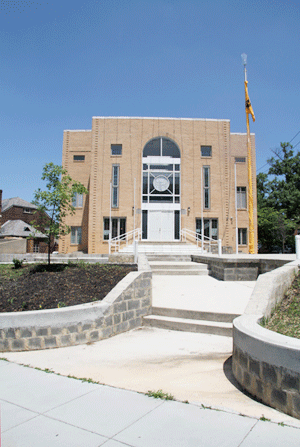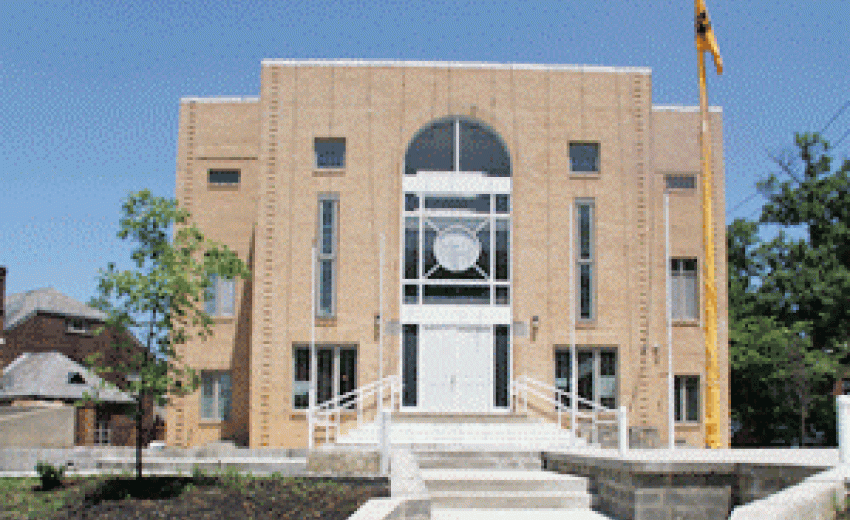WASHINGTON – A Washington judge unsuccessfully tried to convince lawyers for the two disputing parties from the National Gurdwara last week to come to some sort of agreement.
 |
|
The National Gurdwara is on Embassy Row, less than four miles from the White House. Image by SikhNN |
“If there was something that I can do or maybe something I could say to the whole group of them: You’re supposed to be, I think, God-fearing people, however you want to put it. How can we be at each other’s throats, destroying anybody, any single person?” said District of Columbia Superior Court Judge Bruce Beaudin. “Whether you think it’s working right or not, you can both go to the board of directors, you can do all kinds of things.
“This is not going to yield anything,” he said of the case. “It’s not going to make the church stronger. It’s going to be weak no matter what anybody does. And it’s like a no win (situation).”
Beaudin was speaking in his chambers to Allyson Kitchel, attorney for the plaintiffs, the trustees of the gurdwara, and Robert Tomlinson, attorney for the defense, Amrik Singh Choudhary and his wife Jaspreet Kaur. The judge also allowed the SikhNN reporter to witness the public proceedings on Friday, Nov. 5.
The Sikh Cultural Society of Washington D.C., Inc., established in 1964, is the umbrella organization that built the gurdwara on its property at 3801 Massachusetts Ave., NW. The area, known as Embassy Row, is surrounded by the world’s embassies and is about 3.5 miles from the White House.
Its trustees filed a complaint on Oct. 22 asking the court to bar the Arlington, Virginia, couple from the building.
“I’m sure God is with us and we are going to win this case,” said Amrik Singh, after the hearing. “It is a false case, completely. All the allegations are false.”
“This legal action is to intimidate the congregation,” Jaspreet Kaur said, after the hearing. “Other people are concerned about being framed and dragged into court.” What used to be about 100 people showing up for Sunday divaan are now only about 40, she said.
According to court documents, the couple is accused of disturbing the peace and assaulting Parminder Kaur Babra, the langar coordinator.
“I think that most of the cases that come in here are not like this and they ought to go straight to mediation because they are mostly one-on-one,” Beaudin said. “(But) you usually don’t come into one of these cases with people who want to listen.”
The judge previously has decided cases on paper based on court statements but the two parties in this case involve many people on both sides.
“The people, if they want to be heard, they want to be heard,” he said.
About 25 people showed up at the courthouse on Friday afternoon with Amrik Singh and Jaspreet Kaur, including his parents and brother. They all waited in the corridor outside the judge’s chamber, ready to testify. But none of the trustees made an appearance with their attorney because of “funerals and hospitalizations,” Kitchel told the judge.
“I am personally very disappointed we remain very clannish and we have not advanced our issues on ideological plane. I am talking of all of us together,” said Shamsher Singh, by phone on Monday. He said he was not well and confined at home. He would not talk specifics of the case, deferring to court documents.
“Everything is there,” he said. “There is nothing I can add to it.”
Beaudin ordered the parties to continue with the evidentiary hearing on Dec. 10, to “accommodate absent witnesses” on the plaintiff’s side. But he was not happy about continuing with the legal proceedings.
“Talk to your clients about resolving this,” the judge said. “I am not talking about settling the case, I am talking about settling the case where everyone can live in peace.”
Neither lawyer thought that their clients could reach an amicable solution.
“They have contested each and every fact allegation,” Kitchel said of the defendants. “A TRO (temporary restraining order) does not afford a permanent nature of relief that the society is seeking.” The judge heard the defendants on Oct. 25 at the first hearing and ordered the restraint. The couple agreed to stay away from the gurdwara until the case is decided. But the society is asking the court to permanently prevent them from coming within 100 feet of the gurdwara.
“If these people could find another place to go, the case would be over,” the judge said.
“My client has held a relationship (with this gurdwara) for five years,” Tomlinson said. “The controlling faction disagrees with 90 percent of the congregation.
“On August 15, the five priests who do the gospel (were told to) resign. Ninety nine percent of the congregation was in favor of not firing the priests. Among the less than 10 percent was a woman who was upset. People there said the facts have no bases and have nothing to do with what actually happened.
“The head director wants to sell the building, has financial interest. The head of the majority (Amrik Singh) wants to pledge his own security and take over the mortgage (of the gurdwara). The board is trying to eliminate the congregation…
“When you have 90 percent that can go somewhere else…” Tomlinson was interrupted. “Why don’t the 10 percent go?” the judge completed his sentence. “The problem is that there are underlying issues,” Tomlinson said.
The underlying issues began in 2005, when the building was completed. The gurdwara was built using donations and personal loans from the sangat. Most of the construction cost was covered by personal loans from the Babra family, which controls the board of trustees, and Satwant Kaur Bell, all from the metropolitan Washington area.
Once completed, the society acquired a bank loan to pay off those personal loans, with interest. But without much of a sangat, the gurdwara has been operating under debt ever since.
Several Sikh groups and individuals have offered to take over the debt and acquire the property. Several of the gurdwara’s sangat members have offered to use their houses as collateral and take over the loan, including Amrik Singh. He said he made three proposals.
But the trustees are holding out for a large organization, such as the Shiromani Gurdwara Parbandhak Committee in Amritsar or the Sikh Foundation in California, to make a deal, they have said.
The sangat is concerned that the trustees are planning to sell the building and pocket the money, although that would be an illegal move for the non-profit. Their reservations began when the building was completed and Shamsher Singh Babra placed a $3 million lien on the prestigious property that would only benefit him once the building is sold. Shamsher Singh is one of the original founders, current trustee and director. He is also head of the family and, therefore, head of the board of trustees, which consists mostly of family members.
Sangat members said they were alarmed last year when the building was listed for sale by a local realtor. The listing was removed when they protested. They said that a Muslim group had expressed interest in the property.
Although it is worth several million dollars, sangat members who appeared at the courthouse said, and gurdwara officials have previously said, that the original loan is relatively modest, about $1.5 million.
“We were doing everything to keep the gurdwara from being sold,” said Satwant Kaur, of Alexandria, Virginia, before the hearing. “When finances come up they don’t talk. The general feeling is they are trying to squeeze all of us out so they can do whatever with the property,” she said.
Questions about the finances and disagreements about the raagis came to a head nearly three months ago.
According to court documents, Amrik Singh was apparently displeased by the assignments of the current president, Bakhshish Singh Saini; cashier, Avtar Singh Hanspal; and langar coordinator, Parminder Kaur Babra, who is also Shamsher Singh’s sister-in-law. Since February, he had become increasingly vocal, disruptive and threatening towards the committee and management, court records state.
“He regularly interrupts Sunday gatherings, shouting and berating committee members and management. He has threatened physical violence against the society’s founder and current trustee and director, Shamsher Singh Babra. The society sent two letters advising him that his behavior was unacceptable and asking him to cease and desist… But he continued this behavior, culminating in a physical assault on Ms. Babra on August 15.”
On that Sunday, Nanak Singh Manku, another trustee, had allowed someone to talk for two minutes from the podium in the darbaar hall, before Ardaas. The man was outspoken and protested the dismissal of the gurdwara’s raagi jathaa. The sangat was behind him, Nanak Singh told SikhNN by phone.
“Their services were never the issue,” Shamsher Singh said of the raagis. “The issue was never their kirtan or the character of the bhai sahibs. The issues were different.” He did not want to specify what they were. “Naturally the sangat gets split.”
Nanak Singh does not know what happened after the speech because he left the gurdwara sometime after Ardaas.
According to court documents, the conflict that started in the darbaar hall continued downstairs in the langar hall: “The assault was precipitated by his (Amrik Singh’s) verbal attack on Gajinder Singh (executive director) as a result of which Ms. Babra asked him and his wife to stop disrupting langar. The couple then turned their anger towards Ms. Babra, crossing the langar hall and confronting her. Mrs. Choudhary then grabbed Ms. Babra’s arms and Mr. Choudhary pushed Ms. Babra, causing her to hit her head on the wall behind her, to fall and to briefly lose consciousness.”
According to court records, Parminder Kaur was taken to a hospital by ambulance and a police report was filed. The names of the hospital and police department are not stated. Kitchel did not respond to phone and email requests for these details.
“The society is extremely concerned that Mr. Choudhary will again become violent,” court documents say. A temporary restraining order will be a “public service.”
Amrik Singh and Jaspreet Kaur filed answers to the complaint on Nov. 5, saying that the directors had no authority to appoint anyone and all the conduct was illegal. They denied that they were displeased with the “assignments” or that they ever threatened or assaulted anyone.
“Every time he (Amrik Singh) says something to the sangat, they shut him down,” said Usha Singh of Alexandria, Virginia, at the courthouse. “That’s very shameful for Sikh religion.”
“Amrik Singh comes from a devout Sikh family and his aim is to save the gurdwara,” said Kawal Kaur Chawla of Potomac, Maryland, outside the judge’s chambers. “They (trustees) have taken all our money for 40 years. These (sangat) are people who have been going there all their lives.”
“You have to look at the history of what he (Shamsher Singh) has done,” said Ravinder Singh of Manassas, Virginia. He lived in the gurdwara when it was a small house on Military Road, in Washington. The society bought the house in the early 1970s and sold it in the late 1990s. Ravinder Singh now attends Singh Sabha gurdwara in Fairfax, Virginia.
“It’s a shame for the Sikh community to stand in court trying to save the gurdwara built by sangat for so many years,” he said. “He (Amrik Singh) stood against him (Shamsher Singh). Someone has to stand against the tyranny.”
“I would like all of those who say they have made contributions, to produce the evidence,” Shamsher Singh said by phone a couple of days later. “This is a lot of people… I challenge them to produce the checks. I will give them back with interest. People make false claims. That hurts me as a Sikh."
“When you start talking about politics or religion, people hold their views and you can’t do much to (alleviate) most things,” Judge Beaudin said as the hearing ended. “That’s why I thought I would try.
“I am sorry I failed.”

